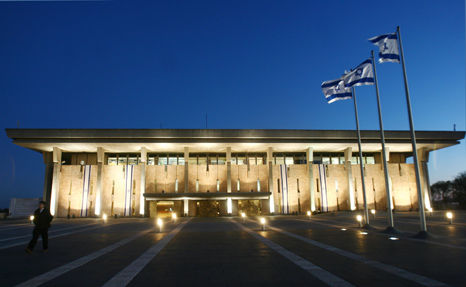The Governance Bill: A Status Update
Below is an update on the status of the proposed Governance Bill and how it aligns with the recommendations of IDI researchers, which was written after IDI experts participated in the deliberations of the Knesset's Constitution, Law, and Justice Committee on the bill.

As the summer session of the Knesset drew to a close, Prof. Gideon Rahat, Director of Research of IDI's Political Reform project, and members of his research team participated in the deliberations of the Knesset's Constitution, Law, and Justice Committee in order to propose corrections to the controversial "Governance Bill" being discussed by the Committee. Their goal: to prevent inadvertent damage to Israel's parliamentary system and facilitate the introduction of vital reforms and improvements.
During the session, Prof. Rahat and his research team supported certain elements of the bill, such as the proposal to limit the size of the government to 18 ministers and four deputy ministers. Regarding other elements of the proposed legislation, such as the proposal to raise the electoral threshold to 4%, the IDI researchers shared their expert knowledge of the subject as part of the meaningful discussion and debate. Other aspects of the legislation, such as the proposal to require a majority of 61 for submitting a vote of no-confidence and a majority of 65 for the no-confidence vote to be effective and lead to the replacement of the government, as well as the proposal to withhold election funding from parties that do not pass the proposed 4% electoral threshold, were opposed by the IDI team.
Following is the status of the bill following the session:
- Government Size: The proposal to limit the number of Ministers in the government to 18 (not including the Prime Minister) and the number of Deputy Ministers to four—which corresponds to the recommendations of IDI's researchers—was accepted.
- Votes of No-Confidence: The Committee accepted a proposal that strikes a balance between the unreasonably large number of no- confidence votes currently submitted to the Knesset and the Draconian proposal to limit the submission of such votes to one a month. According to this balanced proposal, the opposition would be able to submit a no-confidence motion once a month, with exceptions to be made for no-confidence motions signed by a majority of 61 Knesset members. This proposal matches the position of IDI's research team.
- Constructive Votes of No-Confidence: A constructive vote of no confidence adds to government stability by requiring Knesset members who seek to bring down the government to present an alternative government that has the support of a majority of the Knesset at the same time as they submit their no-confidence motion. IDI's researchers have recommended that a constructive vote of no-confidence be included in the Governance Law. While this proposal has not yet been accepted (and a rather strange version of it passed the first reading), it has been met with a positive response.
- Public Funding of Parties: The Knesset Committee currently supports the proposal that public funding be withheld from parties that do not succeed in passing the electoral threshold of 4%. IDI's researchers do not support this proposal, which also has significant opposition within the coalition.
- Raising the Electoral Threshold: It is clear that the proposal to raise the electoral threshold from 2% to 4% is a particularly sensitive change that requires serious discussion and consensus-building. The IDI research team supports an agreed upon, gradual and moderate increase of the electoral threshold.
Related Videos
- Prof. Gideon Rahat on Political Reform in Israel
